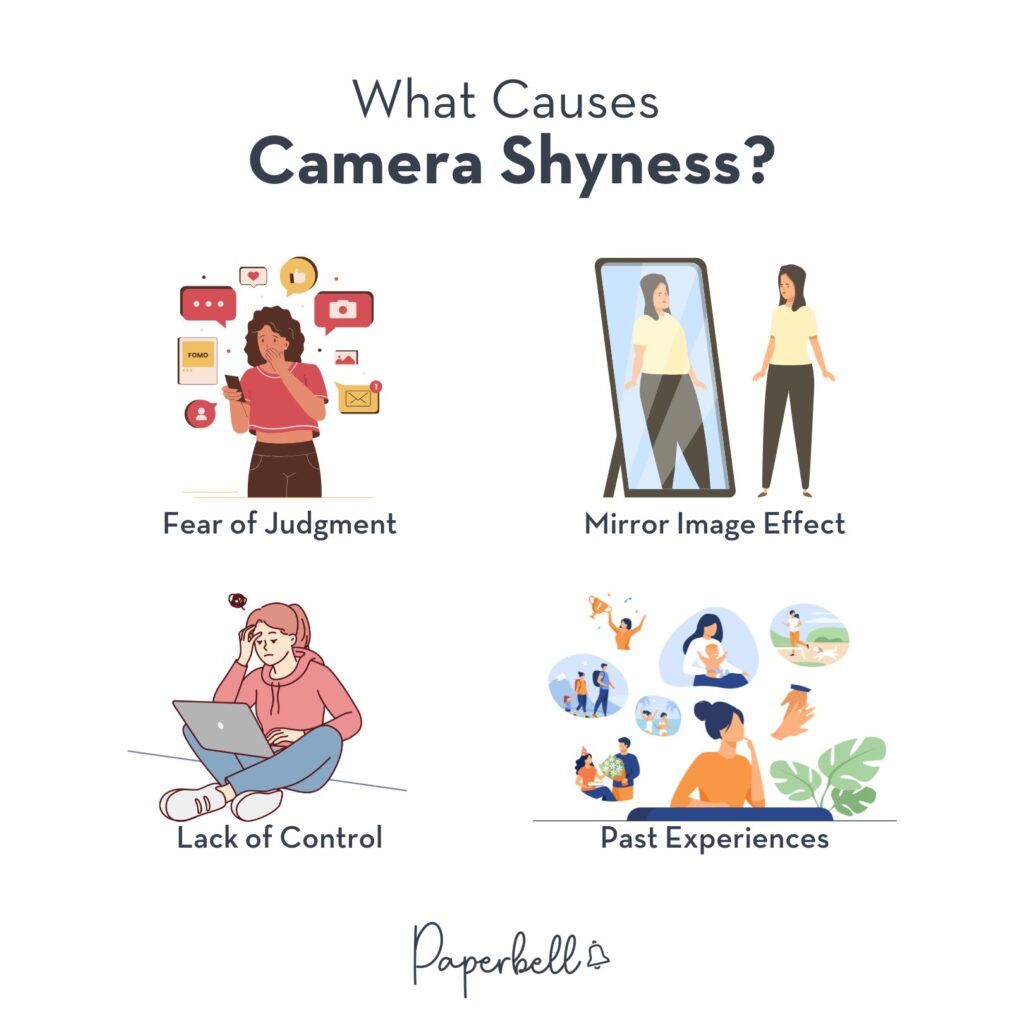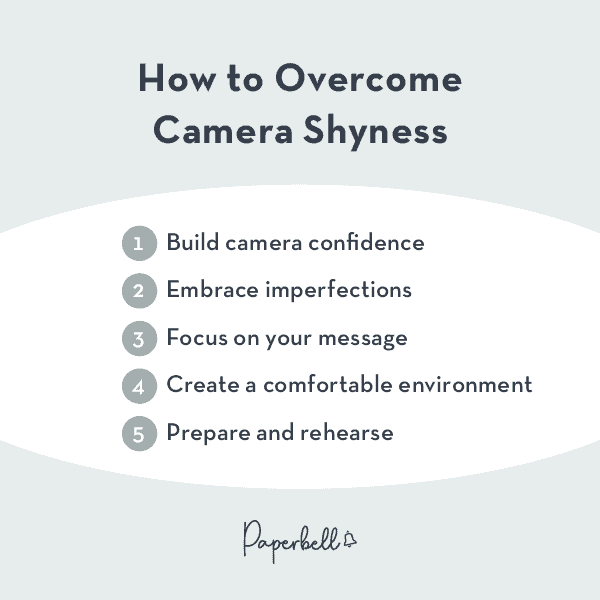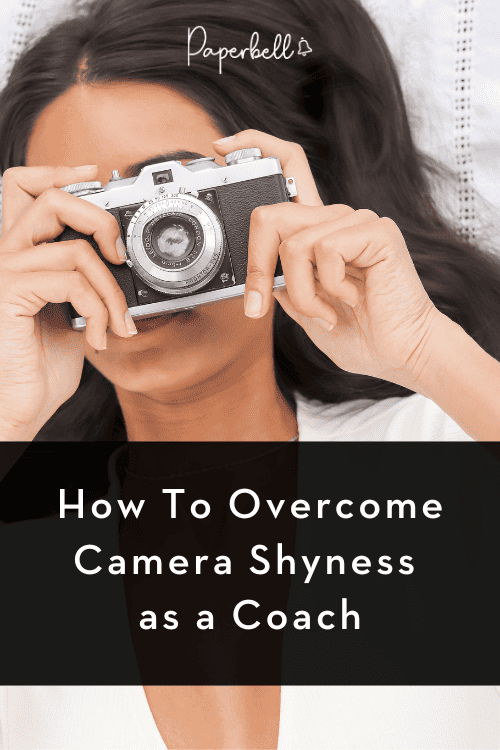In this digital age, camera shyness is a disadvantage if you want to attract global clients—especially because you’ll have virtual coaching sessions.
But if you don’t know how to be comfortable on camera, this guide is for you.
We’ll share proven strategies to become more confident as an online coaching expert.
In this guide, you’ll learn:
- What is camera shyness?
- How to overcome camera shyness
- Effective tips for being on camera
- Camera-confident coaches to inspire you
What is Camera Shyness?
Camera shyness is the discomfort and self-consciousness experienced when appearing on camera.
Some people also experience performance anxiety or camera shyness in front of an audience. It causes symptoms like sweating, shaking, and stuttering, which can make it difficult to perform well.
As a life coaching professional, it can be challenging to create video content, conduct coaching sessions, or participate in public speaking events.
Ultimately, this can negatively impact business growth if not properly addressed.
Factors That Cause Camera Shyness

There are several factors that can make you shy on camera. These include the following:
Fear of Judgment
Many people are self-conscious, and this makes them worry about how they will look and sound on screen.
They may feel insecure about their appearance, voice, or body language. More so, they might doubt their ability and expertise, which can affect their composure on camera.
Mirror Image Effect
When we see ourselves in a mirror (or through our webcam), we’re viewing a reversed version of our face.
This unfamiliarity can make us uncomfortable with our own reflection and increase feelings of self-consciousness on screen.
Lack of Control
Being recorded means relinquishing control over how others perceive you.
You might feel nervous because you can’t control what they think and how they’ll react once your video is out there for all to see and comment on.
Past Experiences
If you’ve had negative experiences while being filmed or in public speaking events in the past, this can cause anxiety around future camera-related situations.
Benefits of Being Confident on Camera
With video platforms like TikTok and virtual meetings taking over the coaching industry, appearing on camera is increasingly important for coaches.
It can lead to several benefits, such as letting you do the following:
- Connect with your audience and clients on a deeper level
- Build your personal brand through video marketing
- Reaches a wider audience through virtual summits
- Get more leads and coaching clients for your business
For example, you can host a webinar about your niche—health, self-development, or business. This will allow you to draw in interested leads who may become paying clients of your business.
How to Overcome Camera Shyness

Want to stop being shy on camera? Here are six steps to conquer camera shyness and confidently present yourself on screen:
1. Build Camera Confidence
When you practice more by intentionally showing up on camera, it will become less intimidating.
You can start by recording short videos of yourself, answering frequently asked questions (FAQs) in your niche, or talking about your personal experiences.
Review these recordings and identify areas for improvement—from your posture to tone of voice and facial expressions.
2. Embrace Your Imperfections
Acknowledge that mistakes are normal. Nobody is perfect—even seasoned public speakers and expert coaches make mistakes occasionally.
Don’t allow those mistakes to discourage you from building on-screen confidence.
3. Focus on Your Message
There are people who sign up for your newsletter, follow your social media profile, and read your blog posts because they want to hear what you have to say.
Instead of fixating on your appearance or voice, focus on delivering valuable content that aligns with your audience’s needs and aspirations.
This, by a long shot, removes the pressure to be perfect and allows you to focus on coaching your audience.
4. Master Public Speaking Skills
Many great public speakers are made.
If you want to become an effective communicator on screen and engage with your audience through video content, learn public speaking techniques.
Here are some tips to get you started:
- Maintain eye contact (or look at the lens)
- Use appropriate body language
- Modulate vocal tones
5. Create a Comfortable Environment
Set up your recording space in a way that puts you at ease.
You can do this by doing the following:
- Add personal touches like family photos, flower pots, figurines, and leaf designs
- Hang inspirational quotes and positive affirmations on the walls
- Set up the lighting to create an ambiance that suits your style
5. Prepare and Rehearse
You need to prepare for your on-screen presentation by rehearsing beforehand.
Relying on prompts or constantly looking at your notes can make you fidget or feel bad about your performance. More so, it negatively affects how your audience views your level of expertise.
Take some time to familiarize yourself with the content you’ll be discussing.
6. Get Into Your Vibe
Do what makes you feel your best every time you want to go on camera.
- Does dancing ease your anxiety?
- Do you like to pray when you’re unsure?
- Do hip-hop songs make you pumped?
- Is it deep breathing that keeps you calm?
Do these things before you go on screen. This way, you’ll be more excited to share your message and less anxious about who will watch you.
Tips for Being on Camera
Having confidence and poise in front of the camera is key to building trust with clients.
Here are some quick tips to get comfortable recording yourself and overcome anxiety.
1. Practice Often
The more time you spend in front of the camera, the easier it will become.
You can do the following:
- Start practicing alone or with a friend who can provide feedback
- Record yourself giving a short presentation
- Answer common questions from clients while looking into the lens
2. Use the Mirror Image Technique
Another helpful thing is to try the mirror image technique.
It’s a helpful exercise that involves practicing speeches in front of a mirror. This allows you to observe your body language and facial expressions, making adjustments as needed.
2. Set Up Your Recording Background
A well-lit space can improve your confidence while creating a clear presentation for viewers.
Ensure you use sufficient lighting from behind the camera and avoid direct light that can cause you to feel uncomfortable or distracted.
Additionally, choose a clean and uncluttered background to minimize distractions.
3. Be authentic
Be yourself when appearing on camera because people are drawn to authenticity.
Embrace your personality and let that shine through in every interaction. Doing so will resonate with potential clients looking for someone they can trust and connect with genuinely.
3 Camera-Confident Coaches to Inspire You
These coaches will inspire you to be more confident on camera.
Michelle Kennedy
Michelle Kennedy is an on-camera performance coach. She specializes in helping entrepreneurs and professionals overcome camera anxiety.
She’s been featured in top publications like HuffPost, NPC, and Tiny Buddha. Her signature approach focuses on authenticity over perfection, teaching clients that their natural personality is their greatest asset on camera.
Amy Porterfield

Amy Porterfield is a digital marketing coach and an influential voice in the business world. She has built a multimillion-dollar empire by teaching entrepreneurs how to build profitable digital courses.
Amy’s “Digital Course Academy” has helped thousands of business owners turn their expertise into digital products that sell. Her podcast, Online Marketing Made Easy, and social media videos teach entrepreneurs actionable strategies for business growth.
Mike Pacchione
Mike Pacchione is a keynote speaker and public speaking coach who helps clients deliver the best speech of their lives.
Mike has coached some of the best coaches and marketing experts, like James Clear, Amy Porterfield, Donald Miller, and Pat Flynn. He teaches that camera confidence stems from the same fundamentals as stage presence—strong preparation, storytelling skills, and genuine audience connection.
Become a Successful Life Coach
Do you need help launching your coaching practice or want to simplify the admin side of your business?
With Paperbell, running a coaching business online has never been easier! You can manage every aspect of your business, from launch to onboarding, sales, and admin tasks. Try Paperbell for FREE today.

Editor’s Note: This post was originally published in June 21, 2023 and has since been updated for accuracy.









